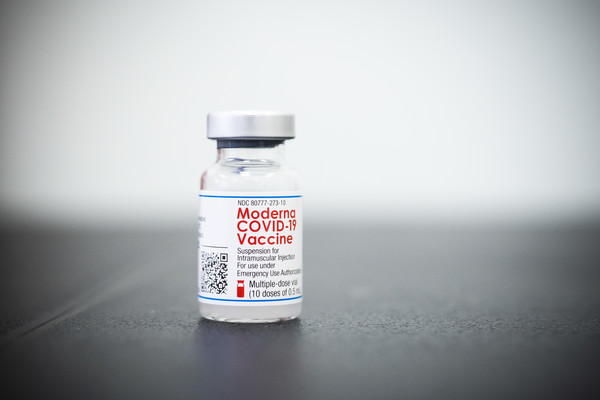Cheong Wa Dae and the ruling Democratic Party of Korea have praised Samsung Biologics' deal with Moderna to manufacture the latter's mRNA Covid-19 in Korea as a huge success.
However, experts showed more cautious reactions to the deal and other vaccine-related agreements.
Some industry officials and health experts expressed disappointment that the summit did not result in the initially anticipated vaccine swap. Vaccine swap refers to the exchange of vaccines in which Korea receives the vaccine first, and then Korea produces and repays the vaccine at a later date.

An infectious disease expert noted that the agreement has little meaning as it will not affect the immediate supply and demand of vaccines, making it difficult to achieve the goal of advancing the herd immunity period.
"We had expectations that Korea would be able to import vaccines as early as possible through the vaccine swap and advance attaining herd immunity from the initially targeted November," Professor Choi Jae-wook at Korea University College of Medicine was quoted as saying in an interview. "However, I am very disappointed that the vaccine swap plan failed."
Another expert also pointed out that Samsung Biologics' contract to manufacture Moderna's vaccine did not meet initial expectations as he found the company's job would be to bottle the finished ingredients.
"Even if Samsung Biologics manufactures Moderna's vaccine through the consignment agreement, there is no confirmation that Korea will receive the manufactured vaccine," Professor Kim Woo-joo of the Infectious Disease Department at Korea University Guro Hospital said. "Also, if it is a job of simply bottling the product, it is questionable why Samsung Biologics had to be mobilized."
Professor Kim even noted that the deal would do more harm than good to Samsung Biologics.
"Although Samsung Biologics is not going to make a major transition to a vaccine company, the deal puts them in a situation where they need to reorganize a part of their production plant to manufacture the vaccines and restore the site at a later date," he said.
A local Covid-19 vaccine developer also doubted the vaccine consignment agreement would benefit the Korean people.
"The discussion between the U.S. and Korea only addressed the manufacturing part of the Covid-19 vaccine problem," the Covid-19 vaccine maker employee said to Korea Biomedical Review, asking to remain anonymous due to the sensitivity of the issue. "The deal means that Korea will only serve as a manufacturing, and the U.S. will conduct research and development."
Acknowledging that it is meaningful that Korea will become a Covid-19 vaccine manufacturing hub, the officials said Korea should develop its own vaccine.
Otherwise, every time Korea encounters a pandemic outbreak, the nation will continue to depend on the U.S. for vaccine supply.
"In the sense of achieving vaccine sovereignty for vaccines, a homegrown vaccine is essential," he said. "For this to happen, the government should provide more preemptive supports."
The official noted that vaccine development attempts, like new drugs, do not always produce successful results. "After considering the possibility of failure, the government and companies should make investments through risk-sharing," he said.
However, government officials reiterated that the local manufacturing of end products would be advantageous for vaccine supply, ultimately helping the country to develop an mRNA vaccine in the future.
"Samsung Biologics has been selected to be in charge of the final filling process of Moderna's Covid-19 vaccine as it has considerable technological prowess, such as aseptic processing or maintaining manufacturing quality," Ministry of Health and Welfare Spokesperson Son Young-rae said. "In the case of finished production, few countries have the technology to do it right."
Son also explained that if the finished vaccine product comes out from Korea, it will be more advantageous for vaccine supply and demand.
"Since Korea will produce hundreds of millions of batches of finished products, we will have an advantages position in terms of efficiency of receiving the vaccine," he said.
Regarding the absence of a technology transfer in the agreement, Son noted that since Samsung Biologics will have to manage the quality of the vaccine until the end, technology transfer can occur for various processes that check for such quality problems.
A physician also agreed that the consignment between Samsung Biologics and Moderna would help Korea solve its vaccine shortage issue.
"It is the most important to note that the government has laid the groundwork for manufacturing finished Covid-19 vaccine products in Korea," Professor Lee Jae-gap of the Infectious Disease Department at Hallym University Kangnam Sacred Heart Hospital said. "Since it takes a considerable amount of time to complete the entire process, it is a practical option to serve as a production base for finished products first and supply them locally as quickly as possible."
Lee also stressed that as the National Institute of Health and Moderna decided to cooperate in research and development, the government can acquire technology to develop mRNA vaccine in the mid- to long-term through the cooperation agreement.
"In the meantime, the nation can establish a system that can quickly supply the vaccines through the recent accord to quick supply the vaccines if the country manages to develop its own mRNA vaccine," he said.

